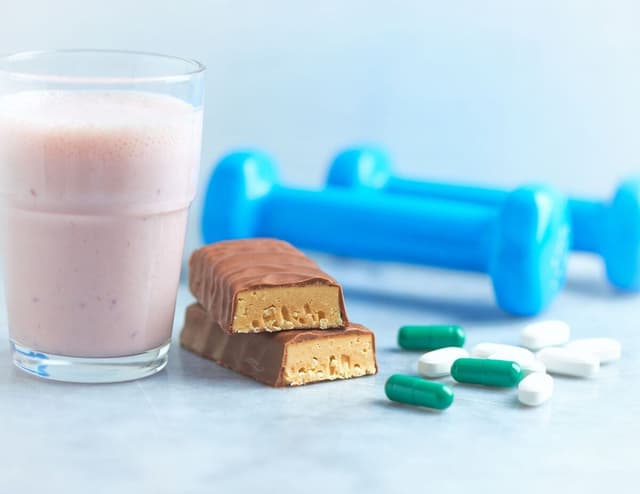Does Creatine Help with Fat Loss? The Role of Creatine in Weight Management

January 4, 2024
In the quest for effective weight management and fat loss, many fitness enthusiasts turn to supplements to enhance their results. Among these, creatine stands out as one of the most researched and popular options available. But does creatine actually help with fat loss, or is it merely a tool for building muscle? In this comprehensive guide, we'll delve into the role of creatine in weight management, exploring how it can aid in fat loss and why choosing the best creatine supplement is crucial for achieving your fitness goals.
Understanding Creatine and Its Benefits
Creatine is a naturally occurring compound found in small amounts in certain foods and synthesized by the body, primarily in the liver, kidneys, and pancreas. It plays a pivotal role in energy production, especially during high-intensity, short-duration exercises like weightlifting and sprinting. Here's a closer look at what makes creatine a staple in many fitness regimens:
How Creatine Works
- Energy Production: Creatine helps regenerate adenosine triphosphate (ATP), the primary energy carrier in cells. By increasing ATP availability, creatine enhances performance during intense physical activities.
- Muscle Growth: By allowing for more intense workouts, creatine indirectly supports muscle hypertrophy, leading to increased muscle mass over time.
- Recovery: Creatine has been shown to reduce muscle cell damage and inflammation, promoting faster recovery post-exercise.
Types of Creatine
There are several forms of creatine available on the market, each with its unique benefits:
- Creatine Monohydrate: The most researched and widely used form, known for its effectiveness and affordability.
- Creatine Ethyl Ester: Believed to have better absorption rates, though research results are mixed.
- Buffered Creatine (Kre-Alkalyn): Designed to reduce the breakdown of creatine in the stomach, potentially improving efficacy.
- Creatine Hydrochloride: Known for its solubility, making it easier on the stomach for some users.
When selecting the best creatine, it's essential to consider factors like purity, absorption rate, and personal tolerance to different forms.
Creatine's Role in Fat Loss
While creatine is primarily associated with muscle gain and strength enhancement, its role in fat loss is both indirect and significant. Here's how creatine can contribute to a fat loss regimen:
Increased Muscle Mass Boosts Metabolism
One of the fundamental principles of fat loss is maintaining a calorie deficit—burning more calories than you consume. Increased muscle mass plays a crucial role in this process:
- Higher Basal Metabolic Rate (BMR): Muscle tissue burns more calories at rest compared to fat tissue. By increasing muscle mass, creatine helps elevate your BMR, leading to more calories burned throughout the day.
- Enhanced Workout Performance: With improved strength and endurance, you can train harder and longer, further increasing calorie expenditure and promoting fat loss.
Water Retention and Perceived Weight
It's important to note that creatine supplementation often leads to water retention within muscle cells:
- Initial Weight Gain: Users may experience a slight increase in body weight due to water retention. This is not fat gain but rather a natural response to increased creatine stores.
- Long-Term Fat Loss Benefits: Over time, as muscle mass increases and metabolism ramps up, the body composition shifts towards more lean mass and less fat, offsetting any initial water weight.
Appetite Regulation and Energy Levels
Creatine may also influence factors that contribute to fat loss:
- Improved Energy Levels: Enhanced energy and reduced fatigue can lead to more consistent and effective workouts, aiding in sustained fat loss efforts.
- Potential Appetite Suppression: Some studies suggest that creatine might play a role in regulating appetite, though more research is needed in this area.
Research Insights
Several studies have explored the relationship between creatine supplementation and fat loss:
- Muscle Preservation During Caloric Deficit: Creatine helps preserve lean muscle mass when individuals are in a caloric deficit, ensuring that the weight loss comes primarily from fat stores.
- Enhanced Fat Oxidation: Some research indicates that creatine may support increased fat oxidation during exercise, contributing to more efficient fat burning.
Choosing the Best Creatine for Weight Management
Selecting the right creatine supplement is vital to maximize its benefits for fat loss and overall weight management. Here's what to consider when searching for the best creatine:
Purity and Quality
- Creapure®: Look for creatine monohydrate products that use Creapure®, a high-purity form of creatine manufactured in Germany, known for its strict quality standards.
- Third-Party Testing: Choose supplements that have been tested by independent organizations like NSF or Informed-Choice to ensure they are free from contaminants and accurately labeled.
Form and Solubility
- Micronized Creatine: This form has smaller particles, enhancing solubility and absorption, reducing the likelihood of gastrointestinal discomfort.
- Creatine Monohydrate vs. Alternatives: While monohydrate is the gold standard, some may prefer alternatives like creatine HCL for better solubility or buffered creatine to minimize stomach issues.
Dosage and Serving Size
- Standard Dosage: A typical dose is 5 grams per day. Some protocols include a loading phase of 20 grams daily for the first week, followed by a maintenance dose.
- Convenience: Choose a product that fits seamlessly into your daily routine, whether it's a powder you can mix with your favorite beverage or capsules for on-the-go use.
Flavor and Mixability
- Unflavored vs. Flavored: Unflavored creatine is versatile and can be added to various drinks without altering the taste, while flavored options can enhance the drinking experience.
Our Top Recommendations

Optimum Nutrition Micronized Creatine Monohydrate Powder
Micronized for easy mixing, supports muscle growth and endurance.
See on Amazon$0.35 per 5g serving

Nutricost Creatine Monohydrate Micronized Powder
Third-party tested, non-GMO, 5g of pure creatine per serving.
See on Amazon$0.2 per 5g serving

NSF Certified, supports muscle power and recovery.
See on Amazon$0.46 per 5g serving

ProMix Creatine Monohydrate Powder
Micronized, additive-free, ideal for performance and recovery.
See on Amazon$0.36 per 5g serving

NOW Foods Sports Nutrition Unflavored
100% pure creatine, GMP certified, boosts strength and endurance.
See on Amazon$0.2 per 5g serving
- Solubility: High-quality creatine should dissolve easily in liquids, minimizing clumps and making it easier to consume.
Budget and Value
- Cost-Effectiveness: Creatine monohydrate is generally the most affordable option without compromising on effectiveness.
- Bulk Packaging: Purchasing in larger quantities often reduces the cost per serving, providing better value for long-term use.
Recommended Products
While there are numerous creatine supplements available, some of the top contenders for the best creatine include:
- Optimum Nutrition Micronized Creatine Monohydrate: Known for its purity and excellent mixability.
- Creapure® by German manufacturer AlzChem: Offers high-quality creatine monohydrate with guaranteed purity.
- Transparent Labs Creatine HMB: Combines creatine with HMB for added muscle preservation benefits.
[Internal Link: Check out our top 5 creatine supplements for optimal performance]
How to Incorporate Creatine into Your Fat Loss Plan
To effectively use creatine as part of your weight management strategy, follow these practical steps:
1. Determine Your Dosage
- Loading Phase (Optional): 20 grams per day, split into 4 doses, for the first 5-7 days to saturate muscle creatine stores quickly.
- Maintenance Phase: 3-5 grams per day to maintain elevated creatine levels.
2. Choose the Right Timing
- Post-Workout: Taking creatine after your workout can enhance uptake due to increased blood flow and insulin sensitivity.
- Consistency: Ensure you take creatine daily, even on rest days, to maintain muscle saturation.
3. Stay Hydrated
- Increase Water Intake: Creatine draws water into muscle cells, so it's essential to drink plenty of fluids to stay hydrated and support overall health.
4. Combine with a Balanced Diet
- Protein Intake: Adequate protein supports muscle repair and growth, complementing the effects of creatine.
- Caloric Deficit: Ensure your diet maintains a caloric deficit for fat loss while providing sufficient nutrients to support your training and supplementation.
5. Pair with Strength Training
- Resistance Exercises: Engage in regular strength training to maximize the muscle-building benefits of creatine, which in turn supports a higher metabolic rate.
- Progressive Overload: Gradually increase the intensity of your workouts to continue challenging your muscles and promoting growth.
6. Monitor Your Progress
- Track Metrics: Keep an eye on your weight, body measurements, and performance in the gym to assess the effectiveness of your supplementation and training regimen.
- Adjust as Needed: Based on your progress, you may need to tweak your dosage, diet, or workout routine to stay on track with your fat loss goals.
7. Choose Quality Supplements
- Research Brands: Opt for reputable brands known for producing the best creatine supplements, ensuring you receive a product that delivers on its promises.
Potential Side Effects and Considerations
While creatine is generally safe for most individuals, it's important to be aware of potential side effects and considerations:
Common Side Effects
- Water Retention: As mentioned, creatine can cause muscles to retain water, which may lead to temporary weight gain.
- Digestive Issues: Some users experience stomach discomfort or bloating, especially during the loading phase.
Who Should Avoid Creatine?
- Individuals with Kidney Issues: Those with pre-existing kidney conditions should consult a healthcare professional before using creatine.
- Pregnant or Nursing Women: Limited research is available, so it's best to avoid unless recommended by a doctor.
Best Practices for Safe Use
- Follow Recommended Dosage: Stick to suggested dosages to minimize the risk of side effects.
- Stay Hydrated: Drinking plenty of water can help mitigate water retention and support kidney function.
- Consult a Professional: If you're unsure about starting creatine supplementation, seek advice from a healthcare provider or a certified nutritionist.
Conclusion
Creatine is a powerhouse supplement that goes beyond building muscle and enhancing strength—it plays a significant role in weight management and fat loss. By increasing muscle mass, boosting metabolism, and improving workout performance, creatine supports a comprehensive fat loss strategy. When choosing the best creatine, prioritize quality, purity, and form to ensure you receive the maximum benefits with minimal side effects.
Incorporating creatine into your fitness routine, combined with a balanced diet and consistent strength training, can lead to effective and sustainable fat loss. Whether you're a seasoned athlete or just beginning your weight management journey, creatine offers valuable support in achieving your goals. Ready to take the next step? Explore our articles and start optimizing your fat loss strategy today!






